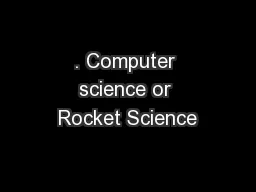PPT-Science vs. Pseudoscience
Author : jane-oiler | Published Date : 2016-07-04
Overview Epistemology Review pseudoscience video Characteristics of science Characteristics of pseudoscience Epistemology Ways of Knowing Authority Logic Life experience
Presentation Embed Code
Download Presentation
Download Presentation The PPT/PDF document "Science vs. Pseudoscience" is the property of its rightful owner. Permission is granted to download and print the materials on this website for personal, non-commercial use only, and to display it on your personal computer provided you do not modify the materials and that you retain all copyright notices contained in the materials. By downloading content from our website, you accept the terms of this agreement.
Science vs. Pseudoscience: Transcript
Download Rules Of Document
"Science vs. Pseudoscience"The content belongs to its owner. You may download and print it for personal use, without modification, and keep all copyright notices. By downloading, you agree to these terms.
Related Documents














